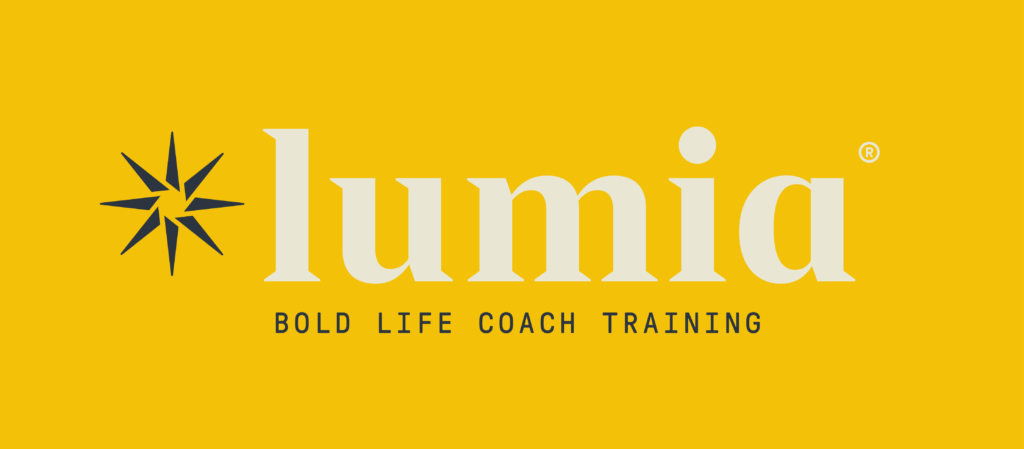The following is a guest post from Noelle Cordeaux the CEO and co-founder of Lumia Coaching and Lumia for Work.
If you are considering coach training, then I highly recommend Lumia. And as an added incentive, they are currently running a special offer for coaches enrolling before the end of the year that will give you a $500 discount.
Do life coaches need training (to be successful)?
The fact is, you don’t need any special training or licensure to start a life coach business. It’s an unregulated industry.
This means that anyone can hang up a shingle and call themselves a coach.
Simple as that.
So why would anyone invest valuable time and resources in coach training and credentials?
It comes down to impact.
As a coach, you want to make a difference.
You have a heart for service, and you’re likely already quite skilled at listening, providing support, and helping others.
And I’m willing to bet that you’ve learned some valuable lessons from the School of Life that others could benefit from!
Here’s what I also know after more than a decade in the coaching industry: those things alone aren’t enough to attain the level of coaching mastery that results in a fully booked practice.
The process of goal attainment, growth, and change isn’t magic, and it doesn’t just happen.
To deliver consistent results as a coach, you need more than an innate ability to build rapport and have insightful conversations.
Coaching mastery is the key to building a sustainable business for the long term.
Why?
Because people aren’t interested in having “a life coach” – when people hire a coach, what they’re looking for above all else is results.
Every client will come to you with a problem that they want to be solved.
Odds are they’ve already been chipping away at it on their own and not getting the desired results.
They usually arrive on your doorstep feeling stuck and yearning for a breakthrough.
Prospective clients want to know that you can cut through the noise and help them get where they are longing to go.
What they need is someone who can facilitate an effective process for turning that desire into concrete, tangible action.

You need a system to be a successful coach
You need coaching tools, frameworks, and strategies. And because humans are all different, you’ll want an arsenal of approaches at your fingertips.
Are there successful coaches out there who have no formal training?
You bet.
Some people build robust coaching practices through a combination of charisma, personality, and the wisdom of their lived experiences.
But here’s what I see more often: untrained coaches who blur the lines between coaching, therapy, consulting, and advising.
This can have unintended consequences, and in some cases may even do harm to the client.
What’s more, coaches who are not familiar with change theory, goal setting techniques, and motivation models are often only able to scratch the surface of an issue.
When that happens, the client will not experience lasting internal change and may continue engaging in the same thinking patterns and unhelpful behaviors that got them stuck in the first place.

Life coach training can give you an advantage
Let’s take a look at what I mean by this.
People often hire a life coach because they want help overcoming a challenge, or to get unstuck either professionally or personally.
And many believe that the key to goal attainment is greater discipline and accountability.
A common example is a client who comes in wanting help with changing careers.
He’s taken all the online strengths finder surveys available, peeked around at dream job listings, and ultimately does what many who desperately want change do: nothing.
Except return to the status quo and job he already knows because fear of change is too heavy.
Eventually, he hires a coach to help him face those fears and find a career he is passionate about. That’s the goal.”
Simple, right?
For an inexperienced coach, perhaps so. But will she apply evidence-based tools that support the client in developing insights along the way?
Will the client be so transformed that he’s raving about the experience to friends and family, sending referrals to the coach that helped to change his life?
Unlikely.
Without an understanding of how the human mind works, coaches often draw from the reservoir of their own personal experiences.
But what’s worked for them may not work for their clients. And even if it does, giving the client all the answers certainly won’t empower them.
Take our career change client as an example, underneath the stated goal, there is likely an even more fundamental desire that remains unexpressed.
The desire for contentment, to feel inspired and purposeful day in and day out , to spend more time with his young children at the park evenings and on the weekends, or simply to have more energy and enthusiasm for life
An effective coach understands both what’s on the surface, as well as what’s going on underneath.
Evidence-based coaching techniques help us to support our clients in connecting their goals, commitments, and action steps to their deepest values, needs, and motivations.
Knowing how to professionally guide a coaching client through this level of self inquiry is a critical skill, which requires both training and practice to develop.
Bottom line: a good coach training program will prepare you to deliver the transformative outcomes that clients are looking for.
In the process of becoming a certified coach, you’ll gain broad exposure to research-based life coaching frameworks, interventions, methodologies, and techniques. You’ll also “learn by doing,” with ample opportunities to test it all out in practice coaching sessions.
Here are just a few of the capabilities you can expect to gain from coach training:
- Serve as a strategic thinking partner
- Apply coaching session frameworks
- Hold non-judgemental space for others
- Identify cognitive biases and mental distortions
- Apply positive psychology interventions (PPIs)
- Communicate more effectively
- Develop meaningful goals and action steps
- Understand your scope of practice, and when it is appropriate to refer out

Are ICF Coach credentials important?
As a professional coach, credentials increase your efficacy and credibility.
Your investment in a coaching education also signals a commitment to ongoing learning, growth, and the application of new knowledge and skills.
I didn’t start off as an International Coaching Federation (ICF) credentialed coach. And when I co-founded Lumia Coaching, we didn’t initially set out to become an ICF accredited training program.
My appreciation for what the ICF brings to the table grew over time.
What eventually won me over was the idea championed by the ICF that clear standards, ethics and guidelines for the profession regarding what coaching is (and what it isn’t) is a good thing for both coaches and consumers.
Coaching is still a relatively young field. It’s only been in existence for a few decades, and we’re still in the process of figuring things out.
That can easily spell confusion for the consumer… along with poor outcomes, and a whole lot of life coach jokes. (You know the ones I’m talking about.)
In my view, the role of the ICF will become increasingly important to the coaching industry as more businesses and individual consumers seek to hire coaching professionals. It is for this reason that I now hold an ICF Professional Certified Coach (PCC) credential myself.
As more coaches enter the marketplace, credentialing may be a strategic way for you to stand out from the crowd. From what I’ve observed, an ICF credential can open additional doors for corporate work, and is recognized in many organizations as the gold standard for coaching.
We are also swiftly moving towards a time when insurance providers will recognize coaching as a service that is vital for preventative health and post-treatment care. Once the insurance companies get in the mix, regulations or licensure of some kind is likely to follow.
What I’ve also witnessed over the past decade is an increasing level of discernment on the part of individual coaching clients.
According to the ICF’s most recent global consumer awareness study, the public is becoming more aware of, and sophisticated about, the field of coaching.
In research undertaken by PricewaterhouseCooper involving more than 30,000 respondents, 85% of prospective coaching clients stated that having a certification/credential is important or very important.
For coaches, this is all good news. It heralds an influx of new opportunities at both the individual and organizational levels. What it also means is that there is a growing demand for practitioners with legitimate credentials in evidence-based models.
While ICF credentials may not be necessary for your path as a coach, we offer this level of training through the Lumia’s Signature Life Coach Training program because we’ve seen how the ICF curriculum and credentialing opens doors, provides deeper insights, and boosts the confidence of our graduates.
In my experience, there are four major reasons people choose to pursue ICF Coach Credentialing:
- To better serve your clients through advanced mastery of the coaching craft
- To access a wider array of employment opportunities, particularly in corporate and business settings
- For personal and professional development
- To work with a specific client who requires ICF credentialing
As the life coaching industry continues to grow, coaches will need to find meaningful ways to differentiate themselves in the marketplace.
Depending upon the type of client you intend to serve, ICF credentials may be one way to set yourself apart.

About the Author
Noelle Cordeaux is CEO and co-founder of Lumia Coaching and Lumia for Work.
She is also a feminist scholar, ICF-credentialed coach, speaker, and sexologist who specializes in the relationship with the self. She has carved out a unique niche in the world of coaching, combining positive psychology with clinical sexology to help her clients gain true progress.
Noelle holds a B.A. in Literature from Rutgers University and a Graduate Certificate in Executive and Professional Coaching from the University of Texas at Dallas.

